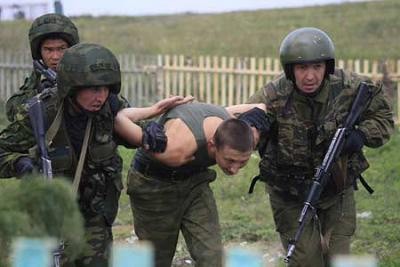Two centuries of intermittent warfare have resulted from the mountaineers’ refusal to submit to Russian dominion, and the nature of the contest has changed little. Clan societies with the enduring custom of blood-feud and criminality as the national pastime can hardly be expected to integrate into whatever model of civil order technocrats in Moscow might have planned. Mountain tribes the world over are known both for their defiance and noble savagery, and those of the Caucasus maintain legendary status in this regard thanks to Mikhail Lermontov and Lev Tolstoy.
After the Second Chechen war wound down, considerable funds have been devoted to reconstruction and economic development across the region. Lower-level bloodshed spread from Chechnya into neighboring republics over the decade, and led to counterinsurgency operations against multiplying terror cells. If the North Caucasus could never be permanently pacified, perhaps it could be bought off. President Dmitry Medvedev has pushed forward with this strategy, appointing a financial expert as his plenipotentiary there. Yet massive funds from the federal budget have done little to change socio-economic conditions. The clans that maintain power dominate what might exist of the local industries and often use the money from Moscow for their own purposes. Even more than in other parts of Russia, corruption is endemic.
When one factors in the growing population among Caucasian Muslims, young men in impoverished cities like Nalchik and Khasavyurt have little opportunity for advancement. They might end up in Moscow as migrant laborers (or engaged in various criminal enterprises), or they could join the local Wahabbi jaamat (Islamic association) and with it the terrorist underground. In either case there is an expanding potential for chaos. Moscow’s Muslim population nears two million, with increasing numbers from the south and Central Asia. Reserves of Russian good will are depleted in the face of displays of Islamic power, habitual violence, and generally aggressive behavior. The Caucasus Emirate is looking to capitalize on events such as the December murder of Russian Yegor Sviridov to ignite interethnic war and push the country over the edge.
Militants have the resources needed to play out their gambit. They possess cash siphoned from crime and corruption, weaponry drawn from government arsenals, and radicalized volunteers with a deep hatred of Russia. And due to the particularities of culture as well as Mohammedan ethical standards, buying off the tribes will come to naught. Presidential advisors like Igor Yurgens and Arkadii Dvorkovich are but liberal social engineers who see the world through an exclusively materialist prism. Their vision of society, a Russia westernized and decadent, can only evoke the contempt of enemies. The Eurasianist Aleksandr Bovdunov writes:
The main allies of the Wahabbis today are the inactivity of the central government, lawlessness in the regions, and Russian national television. So a young Caucasian should love this, respect this? Our Russia [a comedy sketch show], Urgant [an MTV-style television personality], Tsekalo [a producer of musicals], and the iPad- are these your values, Mr. Medvedev? Are these your aspirations, Mr. Dvorkovich? Is all this what is worth living and dying for? If not, then why are you surprised that against such a system of values where deceit and shamelessness are honored and elevated as norms, where the scammer and the prostitute are ideals and examples for the rising generation, these men carry out unrelenting struggle? What is Russia for them?
And what is Russia for ethnic Russians? Never will they gain the affection of the mountaineers, but they could win respect. To do so, the Russian nation must reassert control over its own cultural destiny and act against the liberal forces that corrode, subvert and destroy tradition in the name of the Open Society. Only then might Russia confront separatism and the Islamic challenge, on its own terms and without falling to provocations. In geopolitics as in other matters, beasts of prey are not moved to pity; they can only be defeated through the will to resistance and renewal.
The most profound terror Russia faces is in the premonition of its own death. The effects of the Soviet experiment and its collapse still reverberate today, having brought the Eastern Slavs to the brink of oblivion. Time operates against the Russian people; they face the harsh realities of declining demographics and are scourged by alcoholism, abortion and HIV. Every year 30,000 die from heroin addiction, a phenomenon equivalent to losses in a major regional war. The Kremlin has restored much of its influence in the former Soviet space, but the state can ultimately do little without a spiritual resurgence from Russians themselves.
Wherever doctrines of progress pervade the minds of men, despair and nihilism prevail in their hearts. Modern civilization forsakes God and enshrines self-worship; it proclaims mastery over nature even at its moment of implosion. How frivolous and wretched are the attempts to build a workers’ paradise, or a global society of free and equal consumers, under the shadow of omnipotent death? To stand against desolation and to conquer calls for nothing less than supernatural grace, that the fight for existence might be sanctified. Action in the face of catastrophe only affirms what was revealed in Christ’s path from Golgotha to the Resurrection: Love is stronger than death, and the lives of men and nations attain their full meaning in eternity.
Globalist elites will look on with satisfaction if Russia is eviscerated by plundering oligarchs, jihadists and secular anti-culture before moving in for the kill. Meanwhile Russians are supposed to congratulate themselves on their tolerance and rejoice in disintegration. Yet as Fedor Dostoevsky foresaw, this great Slavic tribe must not perish with the atheistic West, but survive and save it under the sign of the cross. And as our age grows darker, may Russia be a light from the East.




 The January 24th terrorist bombing at
The January 24th terrorist bombing at 

 del.icio.us
del.icio.us
 Digg
Digg